Exploring Pre-Service Teachers' Mathematical Content Knowledge
VerifiedAdded on 2023/02/01
|7
|2719
|94
Essay
AI Summary
This essay delves into the critical importance of mathematical content knowledge (MCK) for pre-service teachers, examining its multifaceted nature and its impact on teaching effectiveness and student achievement. It explores various frameworks, including Shulman's concept of pedagogical content knowledge and Ma's notion of a profound understanding of fundamental mathematics. The paper highlights the significance of specialized content knowledge, common content knowledge, and mathematical horizon knowledge, emphasizing how these components contribute to a teacher's ability to effectively represent mathematical ideas, explain procedures, and address student misconceptions. The study reviews empirical evidence linking teachers' MCK to student outcomes, and it emphasizes the need for pre-service teacher education programs to prioritize the development of a strong foundation in mathematics content. The essay concludes by underscoring that teachers with a solid understanding of mathematical concepts are better equipped to guide students toward meaningful learning, going beyond procedural fluency to foster conceptual understanding and mathematical connections. This essay highlights the importance of teachers' content knowledge and pedagogical content knowledge as the most important determinants of mathematics learning and instruction.
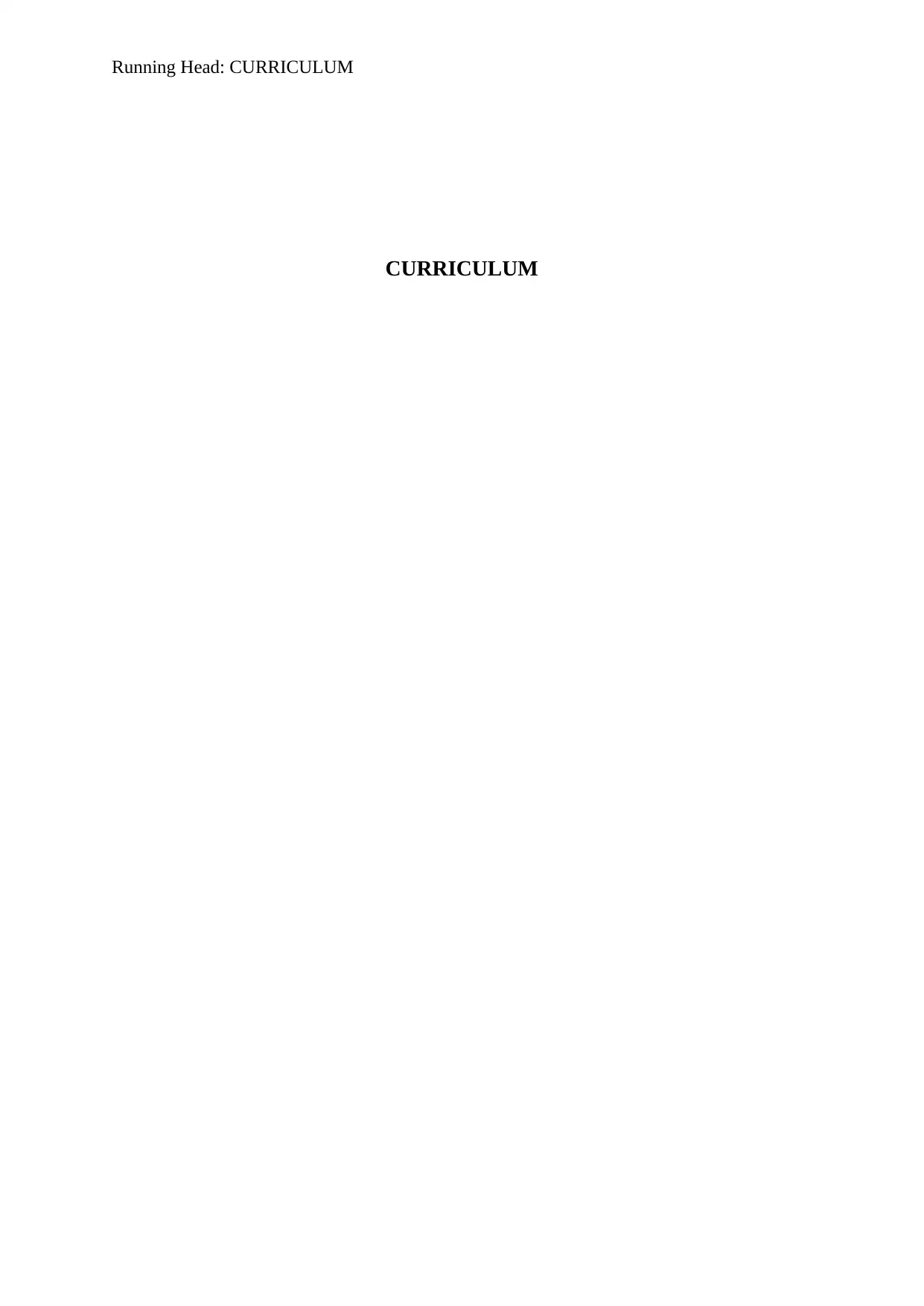
Running Head: CURRICULUM
CURRICULUM
CURRICULUM
Paraphrase This Document
Need a fresh take? Get an instant paraphrase of this document with our AI Paraphraser
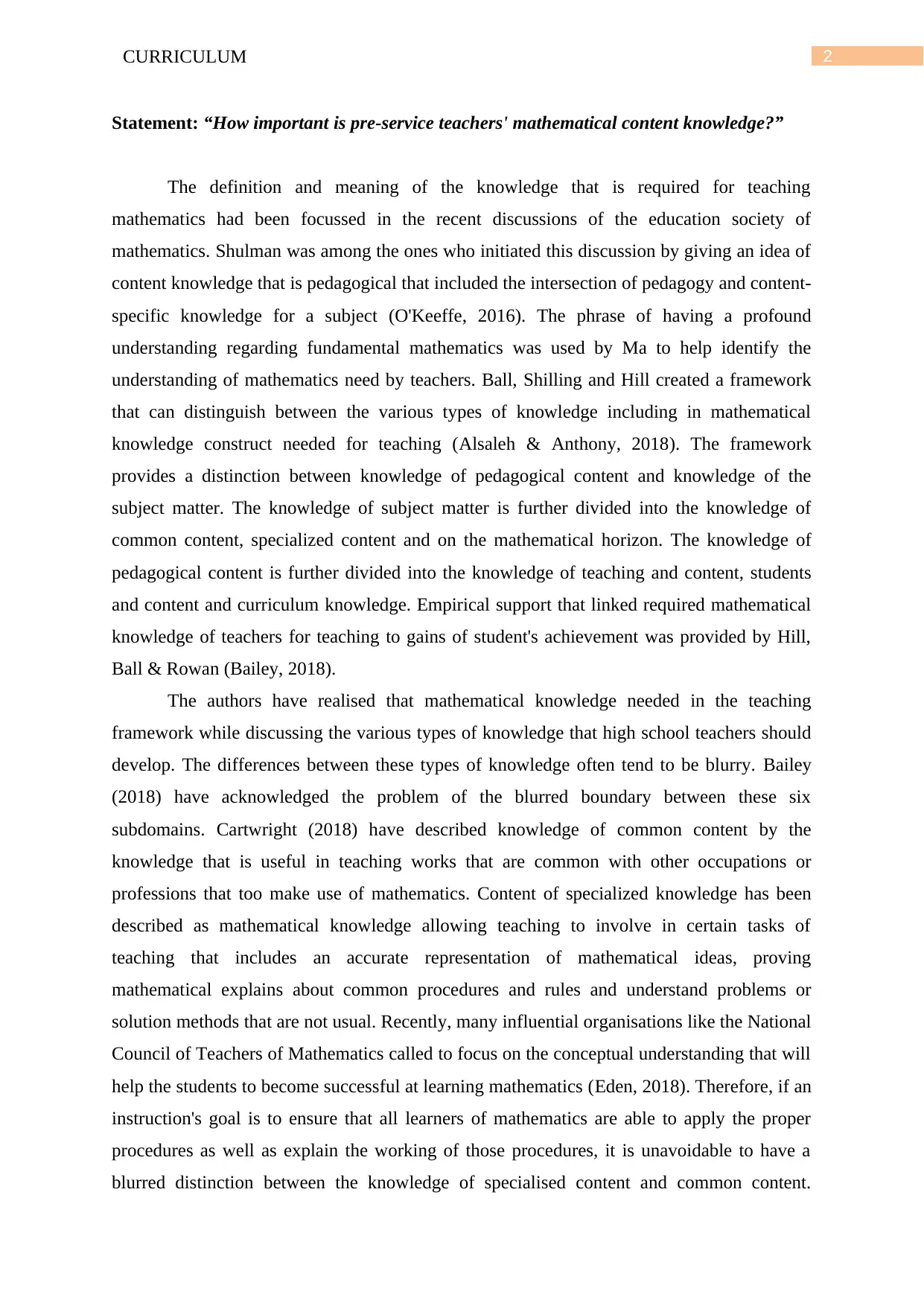
2CURRICULUM
Statement: “How important is pre-service teachers' mathematical content knowledge?”
The definition and meaning of the knowledge that is required for teaching
mathematics had been focussed in the recent discussions of the education society of
mathematics. Shulman was among the ones who initiated this discussion by giving an idea of
content knowledge that is pedagogical that included the intersection of pedagogy and content-
specific knowledge for a subject (O'Keeffe, 2016). The phrase of having a profound
understanding regarding fundamental mathematics was used by Ma to help identify the
understanding of mathematics need by teachers. Ball, Shilling and Hill created a framework
that can distinguish between the various types of knowledge including in mathematical
knowledge construct needed for teaching (Alsaleh & Anthony, 2018). The framework
provides a distinction between knowledge of pedagogical content and knowledge of the
subject matter. The knowledge of subject matter is further divided into the knowledge of
common content, specialized content and on the mathematical horizon. The knowledge of
pedagogical content is further divided into the knowledge of teaching and content, students
and content and curriculum knowledge. Empirical support that linked required mathematical
knowledge of teachers for teaching to gains of student's achievement was provided by Hill,
Ball & Rowan (Bailey, 2018).
The authors have realised that mathematical knowledge needed in the teaching
framework while discussing the various types of knowledge that high school teachers should
develop. The differences between these types of knowledge often tend to be blurry. Bailey
(2018) have acknowledged the problem of the blurred boundary between these six
subdomains. Cartwright (2018) have described knowledge of common content by the
knowledge that is useful in teaching works that are common with other occupations or
professions that too make use of mathematics. Content of specialized knowledge has been
described as mathematical knowledge allowing teaching to involve in certain tasks of
teaching that includes an accurate representation of mathematical ideas, proving
mathematical explains about common procedures and rules and understand problems or
solution methods that are not usual. Recently, many influential organisations like the National
Council of Teachers of Mathematics called to focus on the conceptual understanding that will
help the students to become successful at learning mathematics (Eden, 2018). Therefore, if an
instruction's goal is to ensure that all learners of mathematics are able to apply the proper
procedures as well as explain the working of those procedures, it is unavoidable to have a
blurred distinction between the knowledge of specialised content and common content.
Statement: “How important is pre-service teachers' mathematical content knowledge?”
The definition and meaning of the knowledge that is required for teaching
mathematics had been focussed in the recent discussions of the education society of
mathematics. Shulman was among the ones who initiated this discussion by giving an idea of
content knowledge that is pedagogical that included the intersection of pedagogy and content-
specific knowledge for a subject (O'Keeffe, 2016). The phrase of having a profound
understanding regarding fundamental mathematics was used by Ma to help identify the
understanding of mathematics need by teachers. Ball, Shilling and Hill created a framework
that can distinguish between the various types of knowledge including in mathematical
knowledge construct needed for teaching (Alsaleh & Anthony, 2018). The framework
provides a distinction between knowledge of pedagogical content and knowledge of the
subject matter. The knowledge of subject matter is further divided into the knowledge of
common content, specialized content and on the mathematical horizon. The knowledge of
pedagogical content is further divided into the knowledge of teaching and content, students
and content and curriculum knowledge. Empirical support that linked required mathematical
knowledge of teachers for teaching to gains of student's achievement was provided by Hill,
Ball & Rowan (Bailey, 2018).
The authors have realised that mathematical knowledge needed in the teaching
framework while discussing the various types of knowledge that high school teachers should
develop. The differences between these types of knowledge often tend to be blurry. Bailey
(2018) have acknowledged the problem of the blurred boundary between these six
subdomains. Cartwright (2018) have described knowledge of common content by the
knowledge that is useful in teaching works that are common with other occupations or
professions that too make use of mathematics. Content of specialized knowledge has been
described as mathematical knowledge allowing teaching to involve in certain tasks of
teaching that includes an accurate representation of mathematical ideas, proving
mathematical explains about common procedures and rules and understand problems or
solution methods that are not usual. Recently, many influential organisations like the National
Council of Teachers of Mathematics called to focus on the conceptual understanding that will
help the students to become successful at learning mathematics (Eden, 2018). Therefore, if an
instruction's goal is to ensure that all learners of mathematics are able to apply the proper
procedures as well as explain the working of those procedures, it is unavoidable to have a
blurred distinction between the knowledge of specialised content and common content.
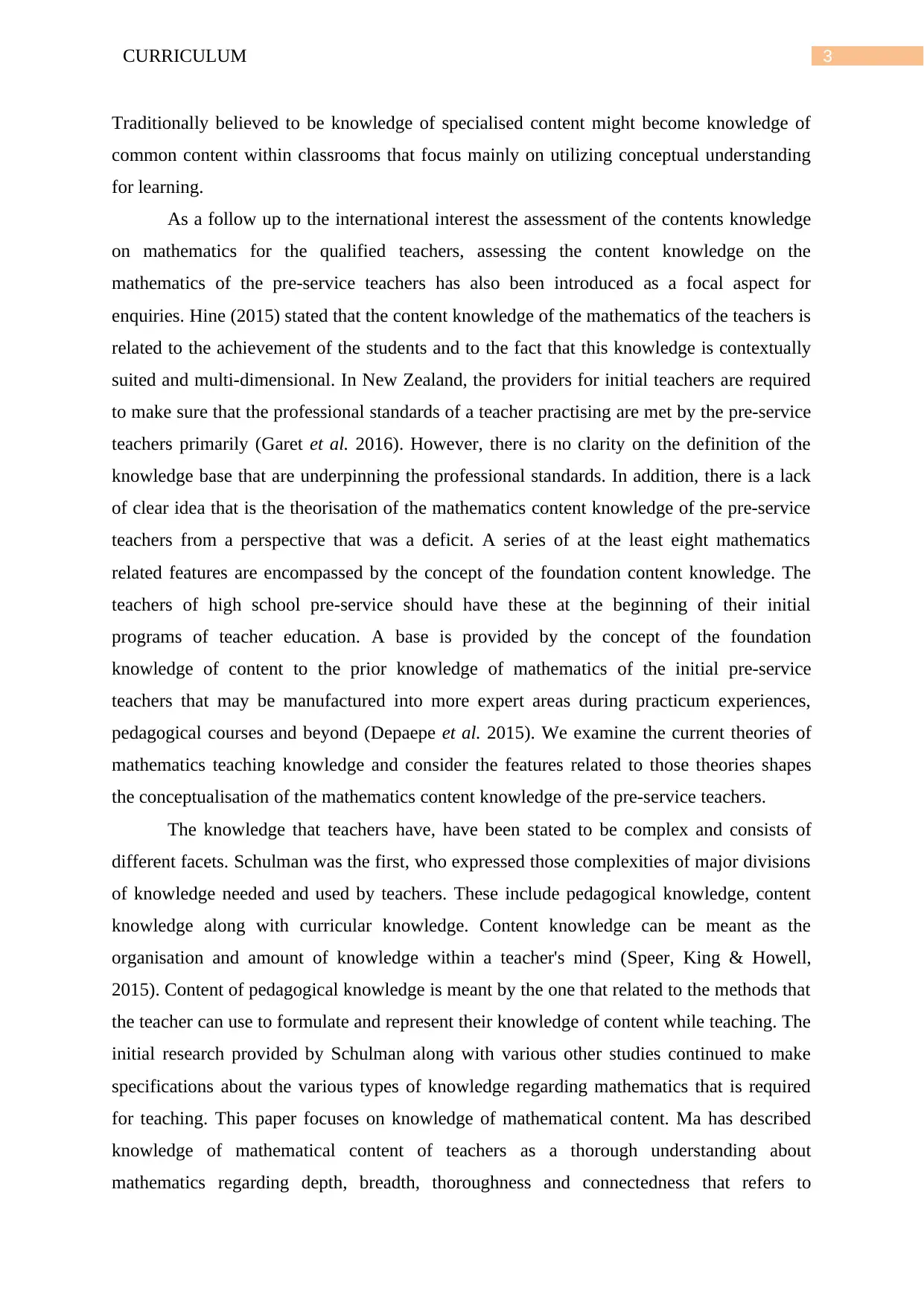
3CURRICULUM
Traditionally believed to be knowledge of specialised content might become knowledge of
common content within classrooms that focus mainly on utilizing conceptual understanding
for learning.
As a follow up to the international interest the assessment of the contents knowledge
on mathematics for the qualified teachers, assessing the content knowledge on the
mathematics of the pre-service teachers has also been introduced as a focal aspect for
enquiries. Hine (2015) stated that the content knowledge of the mathematics of the teachers is
related to the achievement of the students and to the fact that this knowledge is contextually
suited and multi-dimensional. In New Zealand, the providers for initial teachers are required
to make sure that the professional standards of a teacher practising are met by the pre-service
teachers primarily (Garet et al. 2016). However, there is no clarity on the definition of the
knowledge base that are underpinning the professional standards. In addition, there is a lack
of clear idea that is the theorisation of the mathematics content knowledge of the pre-service
teachers from a perspective that was a deficit. A series of at the least eight mathematics
related features are encompassed by the concept of the foundation content knowledge. The
teachers of high school pre-service should have these at the beginning of their initial
programs of teacher education. A base is provided by the concept of the foundation
knowledge of content to the prior knowledge of mathematics of the initial pre-service
teachers that may be manufactured into more expert areas during practicum experiences,
pedagogical courses and beyond (Depaepe et al. 2015). We examine the current theories of
mathematics teaching knowledge and consider the features related to those theories shapes
the conceptualisation of the mathematics content knowledge of the pre-service teachers.
The knowledge that teachers have, have been stated to be complex and consists of
different facets. Schulman was the first, who expressed those complexities of major divisions
of knowledge needed and used by teachers. These include pedagogical knowledge, content
knowledge along with curricular knowledge. Content knowledge can be meant as the
organisation and amount of knowledge within a teacher's mind (Speer, King & Howell,
2015). Content of pedagogical knowledge is meant by the one that related to the methods that
the teacher can use to formulate and represent their knowledge of content while teaching. The
initial research provided by Schulman along with various other studies continued to make
specifications about the various types of knowledge regarding mathematics that is required
for teaching. This paper focuses on knowledge of mathematical content. Ma has described
knowledge of mathematical content of teachers as a thorough understanding about
mathematics regarding depth, breadth, thoroughness and connectedness that refers to
Traditionally believed to be knowledge of specialised content might become knowledge of
common content within classrooms that focus mainly on utilizing conceptual understanding
for learning.
As a follow up to the international interest the assessment of the contents knowledge
on mathematics for the qualified teachers, assessing the content knowledge on the
mathematics of the pre-service teachers has also been introduced as a focal aspect for
enquiries. Hine (2015) stated that the content knowledge of the mathematics of the teachers is
related to the achievement of the students and to the fact that this knowledge is contextually
suited and multi-dimensional. In New Zealand, the providers for initial teachers are required
to make sure that the professional standards of a teacher practising are met by the pre-service
teachers primarily (Garet et al. 2016). However, there is no clarity on the definition of the
knowledge base that are underpinning the professional standards. In addition, there is a lack
of clear idea that is the theorisation of the mathematics content knowledge of the pre-service
teachers from a perspective that was a deficit. A series of at the least eight mathematics
related features are encompassed by the concept of the foundation content knowledge. The
teachers of high school pre-service should have these at the beginning of their initial
programs of teacher education. A base is provided by the concept of the foundation
knowledge of content to the prior knowledge of mathematics of the initial pre-service
teachers that may be manufactured into more expert areas during practicum experiences,
pedagogical courses and beyond (Depaepe et al. 2015). We examine the current theories of
mathematics teaching knowledge and consider the features related to those theories shapes
the conceptualisation of the mathematics content knowledge of the pre-service teachers.
The knowledge that teachers have, have been stated to be complex and consists of
different facets. Schulman was the first, who expressed those complexities of major divisions
of knowledge needed and used by teachers. These include pedagogical knowledge, content
knowledge along with curricular knowledge. Content knowledge can be meant as the
organisation and amount of knowledge within a teacher's mind (Speer, King & Howell,
2015). Content of pedagogical knowledge is meant by the one that related to the methods that
the teacher can use to formulate and represent their knowledge of content while teaching. The
initial research provided by Schulman along with various other studies continued to make
specifications about the various types of knowledge regarding mathematics that is required
for teaching. This paper focuses on knowledge of mathematical content. Ma has described
knowledge of mathematical content of teachers as a thorough understanding about
mathematics regarding depth, breadth, thoroughness and connectedness that refers to
⊘ This is a preview!⊘
Do you want full access?
Subscribe today to unlock all pages.

Trusted by 1+ million students worldwide
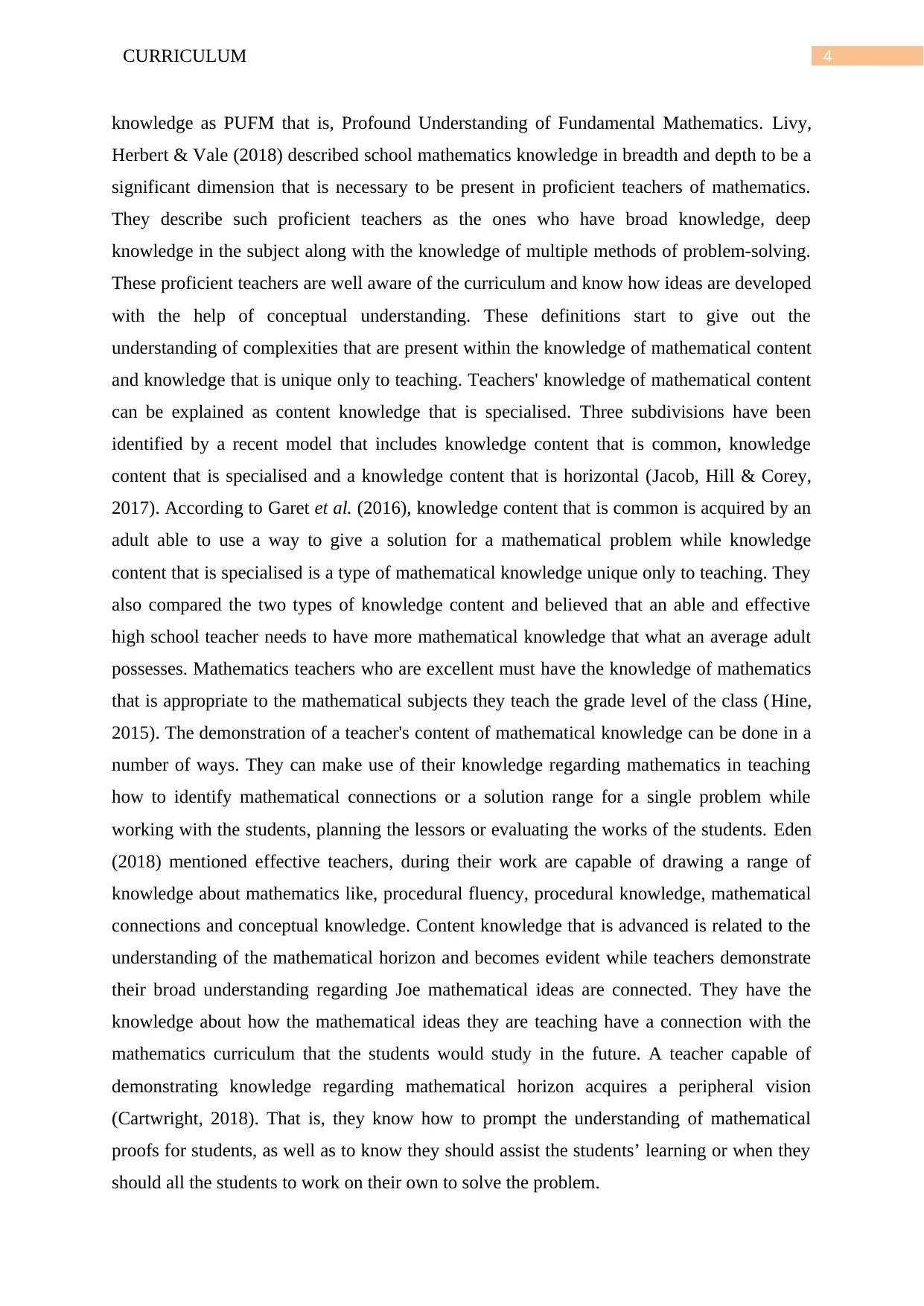
4CURRICULUM
knowledge as PUFM that is, Profound Understanding of Fundamental Mathematics. Livy,
Herbert & Vale (2018) described school mathematics knowledge in breadth and depth to be a
significant dimension that is necessary to be present in proficient teachers of mathematics.
They describe such proficient teachers as the ones who have broad knowledge, deep
knowledge in the subject along with the knowledge of multiple methods of problem-solving.
These proficient teachers are well aware of the curriculum and know how ideas are developed
with the help of conceptual understanding. These definitions start to give out the
understanding of complexities that are present within the knowledge of mathematical content
and knowledge that is unique only to teaching. Teachers' knowledge of mathematical content
can be explained as content knowledge that is specialised. Three subdivisions have been
identified by a recent model that includes knowledge content that is common, knowledge
content that is specialised and a knowledge content that is horizontal (Jacob, Hill & Corey,
2017). According to Garet et al. (2016), knowledge content that is common is acquired by an
adult able to use a way to give a solution for a mathematical problem while knowledge
content that is specialised is a type of mathematical knowledge unique only to teaching. They
also compared the two types of knowledge content and believed that an able and effective
high school teacher needs to have more mathematical knowledge that what an average adult
possesses. Mathematics teachers who are excellent must have the knowledge of mathematics
that is appropriate to the mathematical subjects they teach the grade level of the class (Hine,
2015). The demonstration of a teacher's content of mathematical knowledge can be done in a
number of ways. They can make use of their knowledge regarding mathematics in teaching
how to identify mathematical connections or a solution range for a single problem while
working with the students, planning the lessors or evaluating the works of the students. Eden
(2018) mentioned effective teachers, during their work are capable of drawing a range of
knowledge about mathematics like, procedural fluency, procedural knowledge, mathematical
connections and conceptual knowledge. Content knowledge that is advanced is related to the
understanding of the mathematical horizon and becomes evident while teachers demonstrate
their broad understanding regarding Joe mathematical ideas are connected. They have the
knowledge about how the mathematical ideas they are teaching have a connection with the
mathematics curriculum that the students would study in the future. A teacher capable of
demonstrating knowledge regarding mathematical horizon acquires a peripheral vision
(Cartwright, 2018). That is, they know how to prompt the understanding of mathematical
proofs for students, as well as to know they should assist the students’ learning or when they
should all the students to work on their own to solve the problem.
knowledge as PUFM that is, Profound Understanding of Fundamental Mathematics. Livy,
Herbert & Vale (2018) described school mathematics knowledge in breadth and depth to be a
significant dimension that is necessary to be present in proficient teachers of mathematics.
They describe such proficient teachers as the ones who have broad knowledge, deep
knowledge in the subject along with the knowledge of multiple methods of problem-solving.
These proficient teachers are well aware of the curriculum and know how ideas are developed
with the help of conceptual understanding. These definitions start to give out the
understanding of complexities that are present within the knowledge of mathematical content
and knowledge that is unique only to teaching. Teachers' knowledge of mathematical content
can be explained as content knowledge that is specialised. Three subdivisions have been
identified by a recent model that includes knowledge content that is common, knowledge
content that is specialised and a knowledge content that is horizontal (Jacob, Hill & Corey,
2017). According to Garet et al. (2016), knowledge content that is common is acquired by an
adult able to use a way to give a solution for a mathematical problem while knowledge
content that is specialised is a type of mathematical knowledge unique only to teaching. They
also compared the two types of knowledge content and believed that an able and effective
high school teacher needs to have more mathematical knowledge that what an average adult
possesses. Mathematics teachers who are excellent must have the knowledge of mathematics
that is appropriate to the mathematical subjects they teach the grade level of the class (Hine,
2015). The demonstration of a teacher's content of mathematical knowledge can be done in a
number of ways. They can make use of their knowledge regarding mathematics in teaching
how to identify mathematical connections or a solution range for a single problem while
working with the students, planning the lessors or evaluating the works of the students. Eden
(2018) mentioned effective teachers, during their work are capable of drawing a range of
knowledge about mathematics like, procedural fluency, procedural knowledge, mathematical
connections and conceptual knowledge. Content knowledge that is advanced is related to the
understanding of the mathematical horizon and becomes evident while teachers demonstrate
their broad understanding regarding Joe mathematical ideas are connected. They have the
knowledge about how the mathematical ideas they are teaching have a connection with the
mathematics curriculum that the students would study in the future. A teacher capable of
demonstrating knowledge regarding mathematical horizon acquires a peripheral vision
(Cartwright, 2018). That is, they know how to prompt the understanding of mathematical
proofs for students, as well as to know they should assist the students’ learning or when they
should all the students to work on their own to solve the problem.
Paraphrase This Document
Need a fresh take? Get an instant paraphrase of this document with our AI Paraphraser
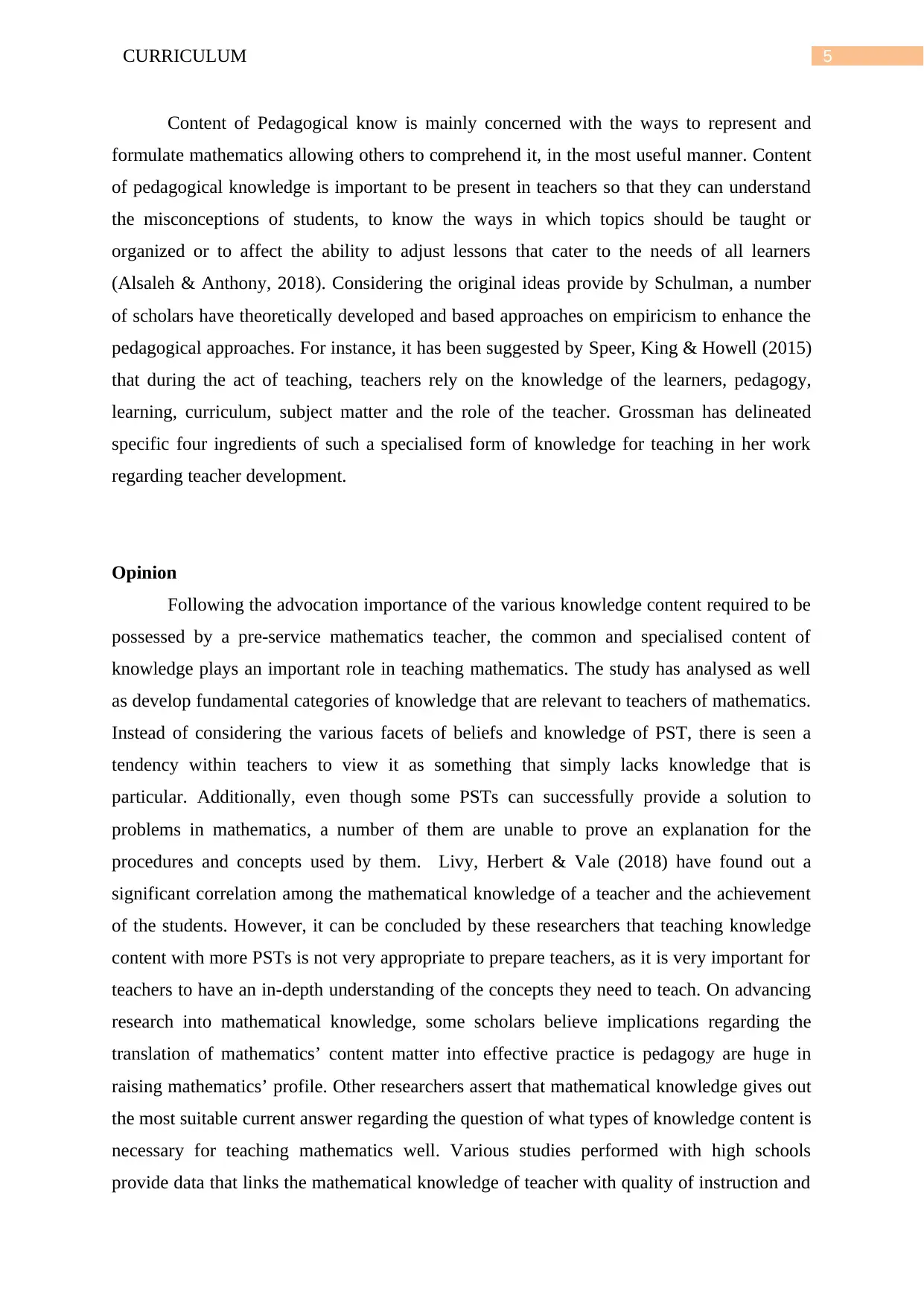
5CURRICULUM
Content of Pedagogical know is mainly concerned with the ways to represent and
formulate mathematics allowing others to comprehend it, in the most useful manner. Content
of pedagogical knowledge is important to be present in teachers so that they can understand
the misconceptions of students, to know the ways in which topics should be taught or
organized or to affect the ability to adjust lessons that cater to the needs of all learners
(Alsaleh & Anthony, 2018). Considering the original ideas provide by Schulman, a number
of scholars have theoretically developed and based approaches on empiricism to enhance the
pedagogical approaches. For instance, it has been suggested by Speer, King & Howell (2015)
that during the act of teaching, teachers rely on the knowledge of the learners, pedagogy,
learning, curriculum, subject matter and the role of the teacher. Grossman has delineated
specific four ingredients of such a specialised form of knowledge for teaching in her work
regarding teacher development.
Opinion
Following the advocation importance of the various knowledge content required to be
possessed by a pre-service mathematics teacher, the common and specialised content of
knowledge plays an important role in teaching mathematics. The study has analysed as well
as develop fundamental categories of knowledge that are relevant to teachers of mathematics.
Instead of considering the various facets of beliefs and knowledge of PST, there is seen a
tendency within teachers to view it as something that simply lacks knowledge that is
particular. Additionally, even though some PSTs can successfully provide a solution to
problems in mathematics, a number of them are unable to prove an explanation for the
procedures and concepts used by them. Livy, Herbert & Vale (2018) have found out a
significant correlation among the mathematical knowledge of a teacher and the achievement
of the students. However, it can be concluded by these researchers that teaching knowledge
content with more PSTs is not very appropriate to prepare teachers, as it is very important for
teachers to have an in-depth understanding of the concepts they need to teach. On advancing
research into mathematical knowledge, some scholars believe implications regarding the
translation of mathematics’ content matter into effective practice is pedagogy are huge in
raising mathematics’ profile. Other researchers assert that mathematical knowledge gives out
the most suitable current answer regarding the question of what types of knowledge content is
necessary for teaching mathematics well. Various studies performed with high schools
provide data that links the mathematical knowledge of teacher with quality of instruction and
Content of Pedagogical know is mainly concerned with the ways to represent and
formulate mathematics allowing others to comprehend it, in the most useful manner. Content
of pedagogical knowledge is important to be present in teachers so that they can understand
the misconceptions of students, to know the ways in which topics should be taught or
organized or to affect the ability to adjust lessons that cater to the needs of all learners
(Alsaleh & Anthony, 2018). Considering the original ideas provide by Schulman, a number
of scholars have theoretically developed and based approaches on empiricism to enhance the
pedagogical approaches. For instance, it has been suggested by Speer, King & Howell (2015)
that during the act of teaching, teachers rely on the knowledge of the learners, pedagogy,
learning, curriculum, subject matter and the role of the teacher. Grossman has delineated
specific four ingredients of such a specialised form of knowledge for teaching in her work
regarding teacher development.
Opinion
Following the advocation importance of the various knowledge content required to be
possessed by a pre-service mathematics teacher, the common and specialised content of
knowledge plays an important role in teaching mathematics. The study has analysed as well
as develop fundamental categories of knowledge that are relevant to teachers of mathematics.
Instead of considering the various facets of beliefs and knowledge of PST, there is seen a
tendency within teachers to view it as something that simply lacks knowledge that is
particular. Additionally, even though some PSTs can successfully provide a solution to
problems in mathematics, a number of them are unable to prove an explanation for the
procedures and concepts used by them. Livy, Herbert & Vale (2018) have found out a
significant correlation among the mathematical knowledge of a teacher and the achievement
of the students. However, it can be concluded by these researchers that teaching knowledge
content with more PSTs is not very appropriate to prepare teachers, as it is very important for
teachers to have an in-depth understanding of the concepts they need to teach. On advancing
research into mathematical knowledge, some scholars believe implications regarding the
translation of mathematics’ content matter into effective practice is pedagogy are huge in
raising mathematics’ profile. Other researchers assert that mathematical knowledge gives out
the most suitable current answer regarding the question of what types of knowledge content is
necessary for teaching mathematics well. Various studies performed with high schools
provide data that links the mathematical knowledge of teacher with quality of instruction and
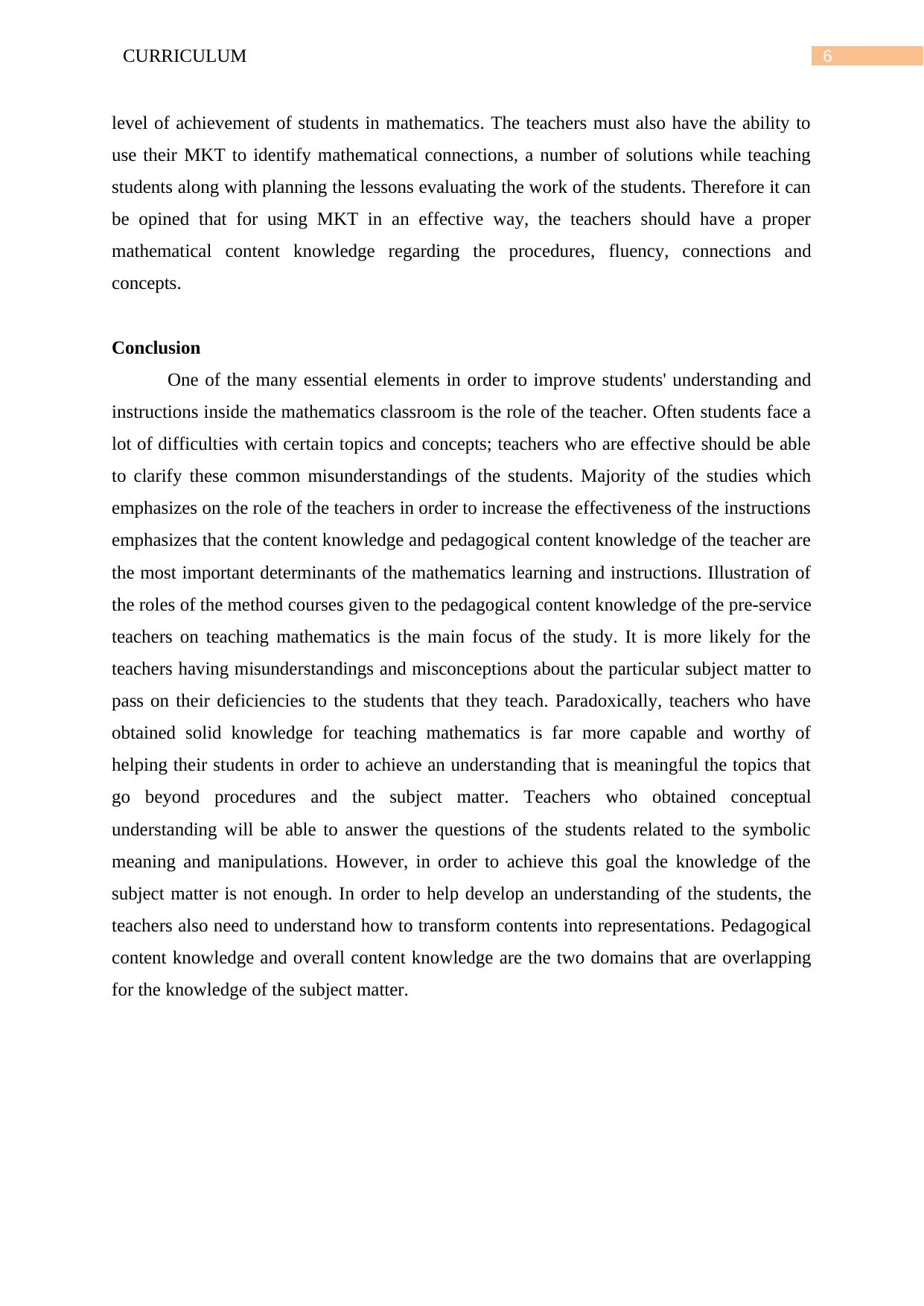
6CURRICULUM
level of achievement of students in mathematics. The teachers must also have the ability to
use their MKT to identify mathematical connections, a number of solutions while teaching
students along with planning the lessons evaluating the work of the students. Therefore it can
be opined that for using MKT in an effective way, the teachers should have a proper
mathematical content knowledge regarding the procedures, fluency, connections and
concepts.
Conclusion
One of the many essential elements in order to improve students' understanding and
instructions inside the mathematics classroom is the role of the teacher. Often students face a
lot of difficulties with certain topics and concepts; teachers who are effective should be able
to clarify these common misunderstandings of the students. Majority of the studies which
emphasizes on the role of the teachers in order to increase the effectiveness of the instructions
emphasizes that the content knowledge and pedagogical content knowledge of the teacher are
the most important determinants of the mathematics learning and instructions. Illustration of
the roles of the method courses given to the pedagogical content knowledge of the pre-service
teachers on teaching mathematics is the main focus of the study. It is more likely for the
teachers having misunderstandings and misconceptions about the particular subject matter to
pass on their deficiencies to the students that they teach. Paradoxically, teachers who have
obtained solid knowledge for teaching mathematics is far more capable and worthy of
helping their students in order to achieve an understanding that is meaningful the topics that
go beyond procedures and the subject matter. Teachers who obtained conceptual
understanding will be able to answer the questions of the students related to the symbolic
meaning and manipulations. However, in order to achieve this goal the knowledge of the
subject matter is not enough. In order to help develop an understanding of the students, the
teachers also need to understand how to transform contents into representations. Pedagogical
content knowledge and overall content knowledge are the two domains that are overlapping
for the knowledge of the subject matter.
level of achievement of students in mathematics. The teachers must also have the ability to
use their MKT to identify mathematical connections, a number of solutions while teaching
students along with planning the lessons evaluating the work of the students. Therefore it can
be opined that for using MKT in an effective way, the teachers should have a proper
mathematical content knowledge regarding the procedures, fluency, connections and
concepts.
Conclusion
One of the many essential elements in order to improve students' understanding and
instructions inside the mathematics classroom is the role of the teacher. Often students face a
lot of difficulties with certain topics and concepts; teachers who are effective should be able
to clarify these common misunderstandings of the students. Majority of the studies which
emphasizes on the role of the teachers in order to increase the effectiveness of the instructions
emphasizes that the content knowledge and pedagogical content knowledge of the teacher are
the most important determinants of the mathematics learning and instructions. Illustration of
the roles of the method courses given to the pedagogical content knowledge of the pre-service
teachers on teaching mathematics is the main focus of the study. It is more likely for the
teachers having misunderstandings and misconceptions about the particular subject matter to
pass on their deficiencies to the students that they teach. Paradoxically, teachers who have
obtained solid knowledge for teaching mathematics is far more capable and worthy of
helping their students in order to achieve an understanding that is meaningful the topics that
go beyond procedures and the subject matter. Teachers who obtained conceptual
understanding will be able to answer the questions of the students related to the symbolic
meaning and manipulations. However, in order to achieve this goal the knowledge of the
subject matter is not enough. In order to help develop an understanding of the students, the
teachers also need to understand how to transform contents into representations. Pedagogical
content knowledge and overall content knowledge are the two domains that are overlapping
for the knowledge of the subject matter.
⊘ This is a preview!⊘
Do you want full access?
Subscribe today to unlock all pages.

Trusted by 1+ million students worldwide
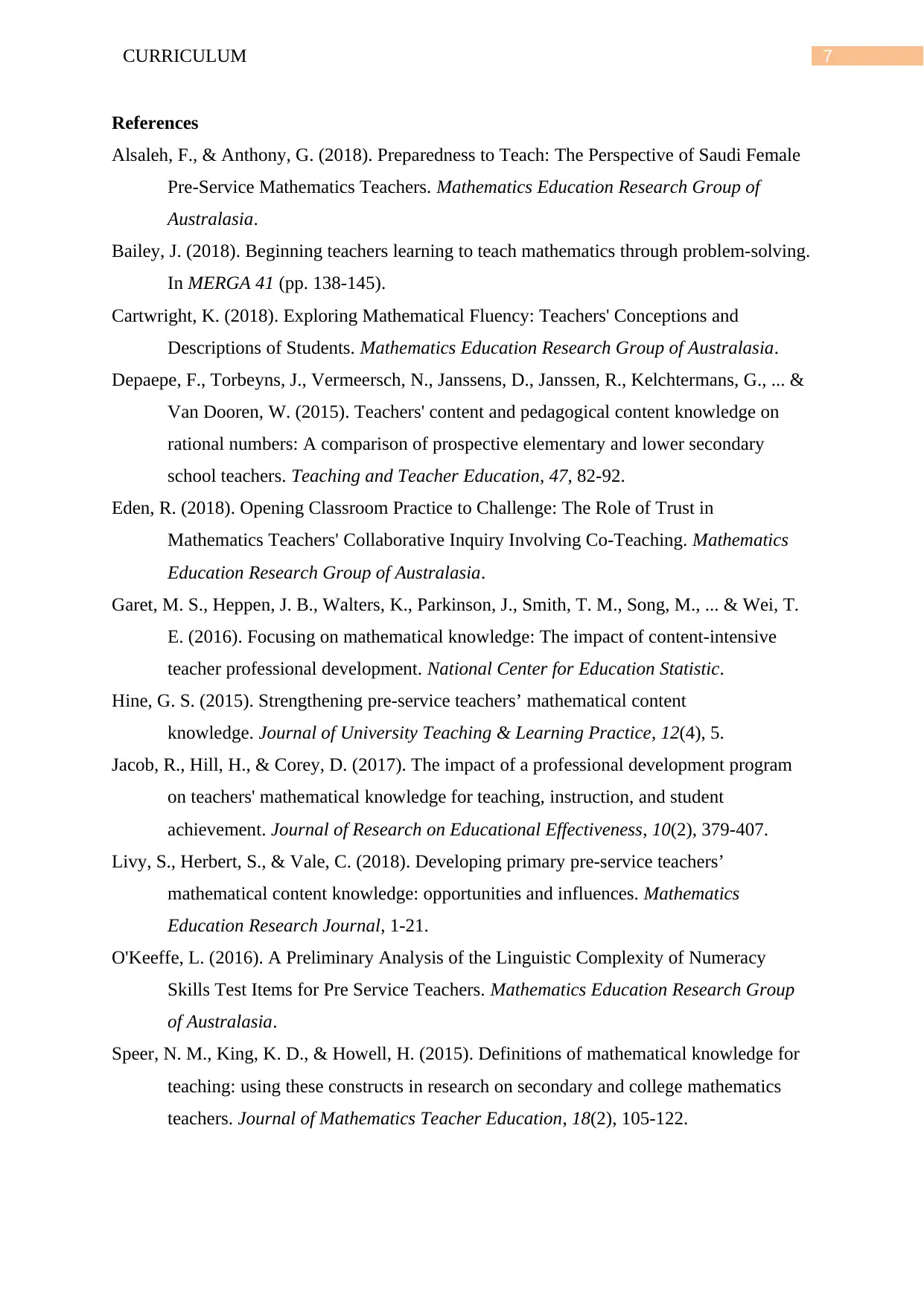
7CURRICULUM
References
Alsaleh, F., & Anthony, G. (2018). Preparedness to Teach: The Perspective of Saudi Female
Pre-Service Mathematics Teachers. Mathematics Education Research Group of
Australasia.
Bailey, J. (2018). Beginning teachers learning to teach mathematics through problem-solving.
In MERGA 41 (pp. 138-145).
Cartwright, K. (2018). Exploring Mathematical Fluency: Teachers' Conceptions and
Descriptions of Students. Mathematics Education Research Group of Australasia.
Depaepe, F., Torbeyns, J., Vermeersch, N., Janssens, D., Janssen, R., Kelchtermans, G., ... &
Van Dooren, W. (2015). Teachers' content and pedagogical content knowledge on
rational numbers: A comparison of prospective elementary and lower secondary
school teachers. Teaching and Teacher Education, 47, 82-92.
Eden, R. (2018). Opening Classroom Practice to Challenge: The Role of Trust in
Mathematics Teachers' Collaborative Inquiry Involving Co-Teaching. Mathematics
Education Research Group of Australasia.
Garet, M. S., Heppen, J. B., Walters, K., Parkinson, J., Smith, T. M., Song, M., ... & Wei, T.
E. (2016). Focusing on mathematical knowledge: The impact of content-intensive
teacher professional development. National Center for Education Statistic.
Hine, G. S. (2015). Strengthening pre-service teachers’ mathematical content
knowledge. Journal of University Teaching & Learning Practice, 12(4), 5.
Jacob, R., Hill, H., & Corey, D. (2017). The impact of a professional development program
on teachers' mathematical knowledge for teaching, instruction, and student
achievement. Journal of Research on Educational Effectiveness, 10(2), 379-407.
Livy, S., Herbert, S., & Vale, C. (2018). Developing primary pre-service teachers’
mathematical content knowledge: opportunities and influences. Mathematics
Education Research Journal, 1-21.
O'Keeffe, L. (2016). A Preliminary Analysis of the Linguistic Complexity of Numeracy
Skills Test Items for Pre Service Teachers. Mathematics Education Research Group
of Australasia.
Speer, N. M., King, K. D., & Howell, H. (2015). Definitions of mathematical knowledge for
teaching: using these constructs in research on secondary and college mathematics
teachers. Journal of Mathematics Teacher Education, 18(2), 105-122.
References
Alsaleh, F., & Anthony, G. (2018). Preparedness to Teach: The Perspective of Saudi Female
Pre-Service Mathematics Teachers. Mathematics Education Research Group of
Australasia.
Bailey, J. (2018). Beginning teachers learning to teach mathematics through problem-solving.
In MERGA 41 (pp. 138-145).
Cartwright, K. (2018). Exploring Mathematical Fluency: Teachers' Conceptions and
Descriptions of Students. Mathematics Education Research Group of Australasia.
Depaepe, F., Torbeyns, J., Vermeersch, N., Janssens, D., Janssen, R., Kelchtermans, G., ... &
Van Dooren, W. (2015). Teachers' content and pedagogical content knowledge on
rational numbers: A comparison of prospective elementary and lower secondary
school teachers. Teaching and Teacher Education, 47, 82-92.
Eden, R. (2018). Opening Classroom Practice to Challenge: The Role of Trust in
Mathematics Teachers' Collaborative Inquiry Involving Co-Teaching. Mathematics
Education Research Group of Australasia.
Garet, M. S., Heppen, J. B., Walters, K., Parkinson, J., Smith, T. M., Song, M., ... & Wei, T.
E. (2016). Focusing on mathematical knowledge: The impact of content-intensive
teacher professional development. National Center for Education Statistic.
Hine, G. S. (2015). Strengthening pre-service teachers’ mathematical content
knowledge. Journal of University Teaching & Learning Practice, 12(4), 5.
Jacob, R., Hill, H., & Corey, D. (2017). The impact of a professional development program
on teachers' mathematical knowledge for teaching, instruction, and student
achievement. Journal of Research on Educational Effectiveness, 10(2), 379-407.
Livy, S., Herbert, S., & Vale, C. (2018). Developing primary pre-service teachers’
mathematical content knowledge: opportunities and influences. Mathematics
Education Research Journal, 1-21.
O'Keeffe, L. (2016). A Preliminary Analysis of the Linguistic Complexity of Numeracy
Skills Test Items for Pre Service Teachers. Mathematics Education Research Group
of Australasia.
Speer, N. M., King, K. D., & Howell, H. (2015). Definitions of mathematical knowledge for
teaching: using these constructs in research on secondary and college mathematics
teachers. Journal of Mathematics Teacher Education, 18(2), 105-122.
1 out of 7
Your All-in-One AI-Powered Toolkit for Academic Success.
+13062052269
info@desklib.com
Available 24*7 on WhatsApp / Email
![[object Object]](/_next/static/media/star-bottom.7253800d.svg)
Unlock your academic potential
Copyright © 2020–2026 A2Z Services. All Rights Reserved. Developed and managed by ZUCOL.


